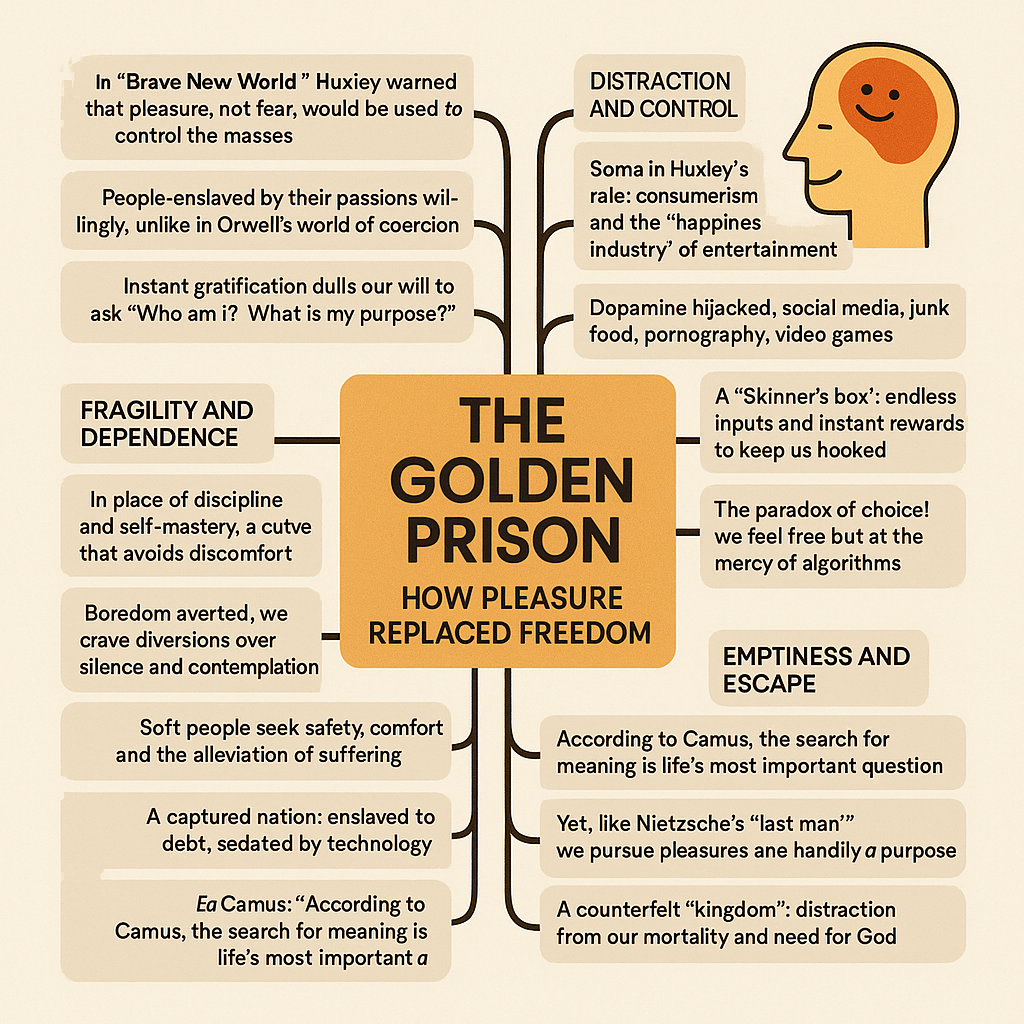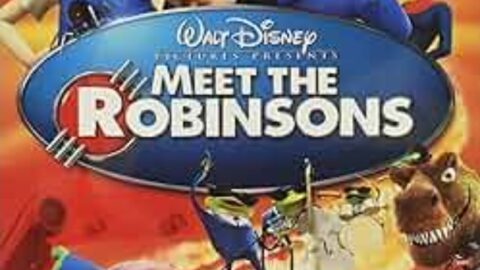Introduction: The Invisible Cage
“The victims of pleasure never protest.” – Aldous Huxley
Why is it so hard to put down your phone? Why does the empty feeling always return no matter how many likes you get, how many episodes you binge, or how much you buy?
Nearly a century ago, Aldous Huxley warned us in Brave New World: the future would not be ruled by chains of fear, but by chains of pleasure. Unlike Orwell’s world of 1984, where people were crushed by force, Huxley foresaw a future where people would gladly build their own cages — so long as the cages were comfortable.
Today, that future has arrived.
Huxley’s Vision: The Power of Pleasure
In Brave New World, the drug Soma kept society pacified. It erased sadness, erased pain, erased thought.
We may not have Soma, but we have its modern equivalents:
- Phones: endless scrolling as a quick hit of relief.
- Food delivery and shopping apps: instant comfort at the tap of a button.
- Pharmaceutical overreach: medicating away sadness, boredom, or normal anxiety rather than listening to what those emotions signal.
These are not cures. They are comforts — comforts that keep us from asking hard questions:
- Why am I living like this?
- What really makes me happy?
- What kind of person do I want to become?
Skinner’s Box: Why We’re Addicted
Psychologist B.F. Skinner discovered that behavior is most powerfully shaped by variable rewards — rewards that arrive unpredictably.
Slot machines work this way: sometimes you win, most times you don’t, but you keep pulling the lever.
Social media is the digital slot machine:
- Sometimes there’s a like, sometimes a comment, sometimes nothing.
- The uncertainty makes it addictive.
Our phones have become Skinner boxes. Each check of notifications is a lever pull. We are not users — we are subjects in an experiment designed to profit from our attention.
Algorithms: The Subtle Sculptors of Desire
We think we choose what to watch, what to listen to, what to like. In reality, algorithms are shaping our desires by:
- Showing us not what we want, but what they want us to want.
- Nudging us gradually until our “preferences” feel organic, but were engineered.
- Offering the illusion of freedom through thousands of options — all within their curated box.
You can pick any show, song, or opinion, but only from within the spectrum the system allowed. The appearance of infinite freedom hides invisible walls.
Dopamine Hijack: Why Nothing Feels Enough
Dopamine, often called the “happiness chemical,” is really the anticipation chemical. It drives us to seek rewards.
Tech, food, porn, and consumerism hijack dopamine with artificial spikes far higher than natural life ever offered.
- Likes feel better in anticipation than in reality.
- Shopping thrills fade the moment after purchase.
- Junk food excites more in the thought than in the taste.
The problem: once dopamine is overstimulated, normal life loses its shine. A walk in nature, a conversation, or finishing a project feels dull compared to digital fireworks. So the cycle accelerates: always chasing, never satisfied.
Aversion to Discomfort: Why We Run from Ourselves
When left alone with nothing to do, most people panic. A University of Virginia study showed that 67% of men and 25% of women preferred to shock themselves with electricity rather than sit quietly with their own thoughts.
This proves something profound: people will choose pain over introspection.
And so, in a world where distraction is available 24/7, introspection almost never happens. Without silence, we never face the truths that hurt — and therefore never grow.
The Comfort Prison
Modern life is more comfortable than any era in history. Yet this comfort has made us weak.
- Slow Wi-Fi triggers disproportionate anger.
- Waiting five minutes feels intolerable.
- Small inconveniences seem like crises.
Comfort addiction shrinks our lives. We avoid risks, avoid growth, avoid challenges. Nietzsche called this the rise of the “last man”: people who trade greatness for security, ambition for small pleasures, and purpose for convenience.
Fragility and Consumer Society
Emotional resilience has collapsed. Criticism becomes trauma, rejection becomes depression, disappointment becomes anxiety.
This fragility is not natural. It is cultivated. Why? Because fragile people consume more.
- Fragile people need constant distraction.
- Fragile people buy more products to soothe.
- Fragile people are easier to control.
Resilient people are dangerous to the system. They cannot be manipulated by every discomfort. That’s why resilience is discouraged and fragility is rewarded.
Avoiding Mortality, Avoiding Meaning
Philosopher Albert Camus said the only serious question is whether life is worth living. Yet modernity distracts us from ever asking it.
Mortality should wake us up: life is short, time is precious, choices matter. But we drown in entertainment, consumerism, and trivial pursuits to avoid confronting the inevitable.
Ironically, those who survive near-death experiences often reorder their lives around relationships, purpose, and meaning. Why must it take trauma to wake us up?
The Paradox of Choice
Endless options don’t liberate us; they paralyze us.
- Streaming: hours wasted deciding what to watch.
- Shopping: overwhelmed by products, dissatisfied with choices.
- Careers, partners, lifestyles: too many options create constant regret.
This overload breeds anxiety. And corporations exploit it by steering us toward default, profitable options. The illusion of infinite freedom ends in predictable obedience.
The Lost Value of Boredom and Silence
Boredom activates the brain’s default mode network — the state responsible for memory, creativity, and self-reflection.
But boredom is treated as a disease, instantly cured with screens. Without boredom, creativity withers.
Similarly, silence is vanishing. But silence is where we rediscover our inner compass, our authentic desires, our values.
Philosophical and spiritual traditions — monks, mystics, sages — all emphasized silence as essential. Modernity treats it as unbearable.
The Cult of Instant Happiness
Society tells us happiness must be constant. Anything less is failure.
This lie fuels a trillion-dollar industry:
- Products to buy when sad.
- Entertainment to distract when empty.
- Services to ease every discomfort.
But sustainable happiness, or eudaimonia, comes from living with purpose, values, and contribution — things that require discomfort and discipline.
Nietzsche’s Warning: The Last Man
When life is too easy, too safe, too comfortable, the will to grow dies. Nietzsche called the product of this decay “the last man”: someone who avoids risk, avoids discomfort, and lives for small pleasures.
Without challenges, the human spirit turns inward, becoming anxious, depressed, or addicted. When vitality has no constructive outlet, it destroys itself.
The cure is not to escape discomfort, but to embrace it: to seek real challenges, to cultivate growth, to fight for something larger than oneself.
Awakening: Small Choices of Resistance
The good news is that the prison has no locked door. The chains are psychological.
Awakening is not dramatic; it is daily. It happens each time you:
- Choose silence over scrolling.
- Delay gratification instead of numbing yourself.
- Sit with boredom instead of fleeing it.
- Question your desires before consuming.
Each small act reclaims autonomy. Over time, they accumulate into freedom.
Conclusion: The Golden Prison or the Conscious Life
We live in Huxley’s prophecy: a golden prison where pleasure numbs thought, distraction replaces meaning, and comfort erases resilience.
But the prison only works if we never notice the door is open. The first step to freedom is awareness. The second is courage: courage to face discomfort, to ask real questions, to embrace mortality, to live with purpose.
A conscious life is harder — but it is also richer, freer, and more meaningful than the numbed existence offered by the system.
The choice is ours: continue sleepwalking in comfort, or wake up and live deliberately.







